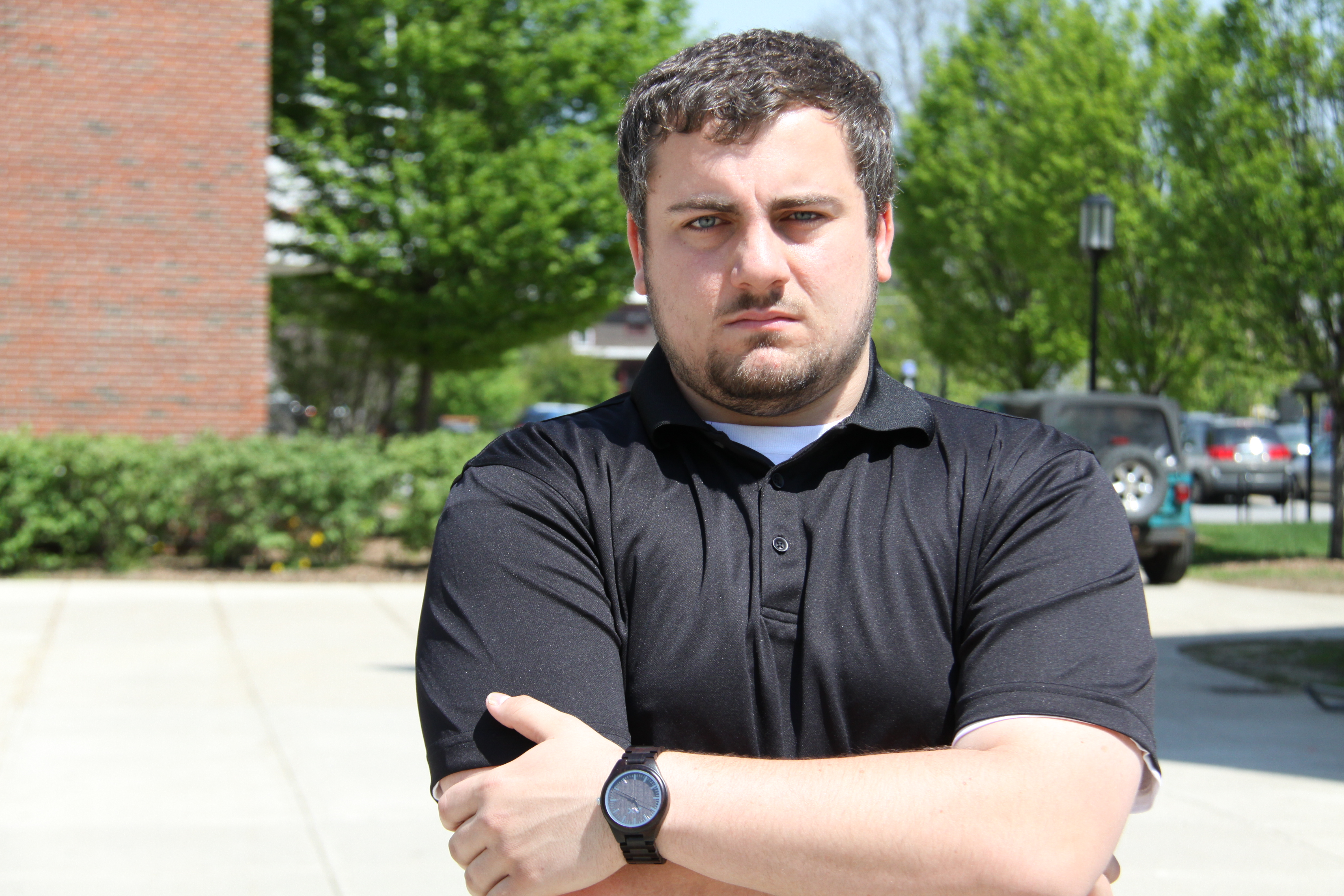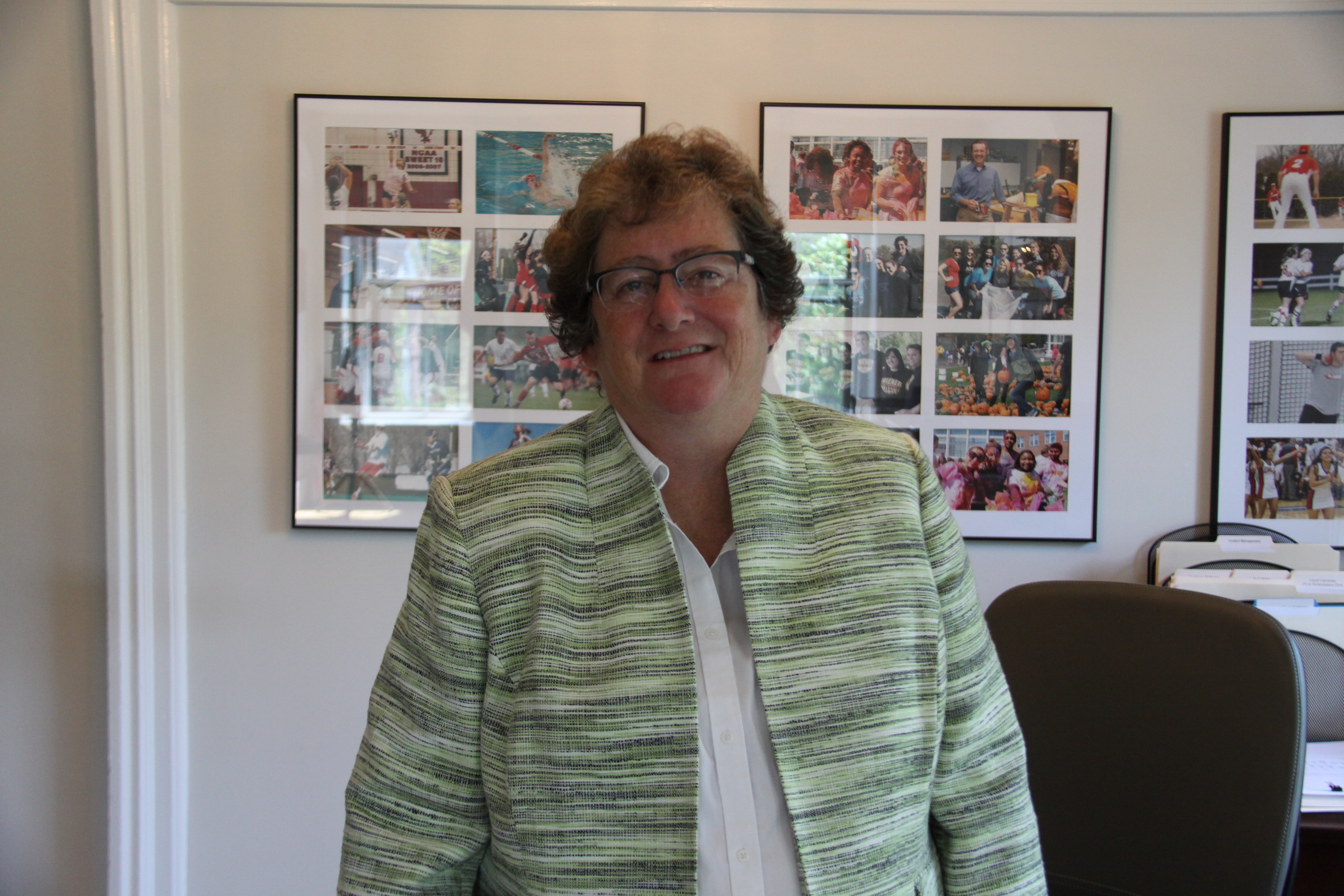
Keene State College senior Crae Messer is managing editor of The Equinox. (Kirk Carapezza/WGBH)
Students and faculty at Keene State College in New Hampshire say the college’s new policy on media interviews is having a chilling effect on free speech on campus. Faculty say the policy pressures them to get clearance before talking to the media about the college, whether it's the student newspaper or off-campus press. Free speech advocates see Keene State as the latest example of a college stifling the free flow of information to protect its public image.
On campus, faculty advisor Julio DelSesto flips through the latest weekly edition of The Equinox, Keene State College's student newspaper. The Equinox has been publishing here since 1929 and this year more than a hundred students contributed to the paper.
In the back of the newsroom, DelSesto points to dozens of awards hanging on the wall.
"We won nearly 150 awards in the past eight years, including two from the Society of Professional Journalists,” DelSesto said. “We have a good tradition of doing good journalism here.”
Producing that journalism, though, has been increasingly difficult, because in March Keene State administrators sent out guidelines recommending that staff and faculty clear interviews through the communications office.
“Even the smallest thing, they were trying to control every little piece of information that we needed to get,” said graduating senior Crae Messer, managing editor of The Equinox. “Even if it wasn’t about anything too important."
The 23-year-old says the communications office would often sit in on interviews and the new guidelines prevents his staff from doing their job.
"For example, the school hired a new cheer leading coach, so we were just trying to do a profile on the cheerleading coach,” Messer recalled. “That kind of thing is just a fluff piece, but people want to know and we couldn't get any of the information that we needed."
In an op-ed published last month, The Equinox staff described "a pattern of suppression."
Free speech advocates worry that Keene State isn't alone as many colleges have moved to protect their reputations.
"There's no question that colleges have become more and more obsessively controlling about their images than they ever have before," said attorney Frank LoMonte, executive director of the Student Press Law Center, a nonprofit legal advocacy organization in Washington D.C.
"State legislatures are withdrawing support from state universities and to make up for that support the colleges have to charge higher tuition and they have to go out into the donor community and depend on gifts from private foundations and corporations and individuals,” LoMonte said. “All of those things are dependent on promoting a positive, favorable public image."
For a small state college, in recent years Keene State's public image has taken a big hit.
Three years ago, the College got international attention after dozens of students rioted during the City of Keene's pumpkin festival near campus. Also, the College's nursing program was put on probation last spring because very few students passed the licensing exam for registered nurses.
Despite these events, Keene State President Anne Huot denies the turmoil sparked the new guidelines.

Keene State College President Anne Huot. (Kirk Carapezza/WGBH)
"We've had a free and open relationship with the press through my entire tenure here, in good times and bad," Huot told me, sitting in her office just off Keene's Main Street.
Huot says that with all that was happening on campus, the faculty came to her seeking guidance about how to handle the media.
"They met a couple of times with our marketing and communications folks and that resulted in what ended up going forward," Huot explained.
According to Huot, members of the journalism faculty asked for the new guidelines.
Asked why journalism faculty have now requested she rescind the guidelines, Huot said the problem is a disagreement about how faculty should interpret them.
“It really is just an entire climate of fear about speaking,” said Chad Nye, who has been teaching journalism at Keene State for the past eight years.
Nye says the policy undermines academic freedom and his department's mission.
"You are preparing that person who is going to go to the Statehouse, is going to Washington D.C., and hold the powerful accountable," Nye said. "But it’s really tricky when you say to them, 'Just don’t start that yet.'"
Last month, Huot reached out to the campus community, hoping to address concerns by telling faculty and staff that they are free to talk with press – student and professional – and that looping in media relations is voluntary.
But Nye and other professors here still worry it's becoming increasingly common for all interactions with journalists on campus to be filtered through the public relations office.
Earlier: Are College Administrators Stifling Free Speech On Campus?










